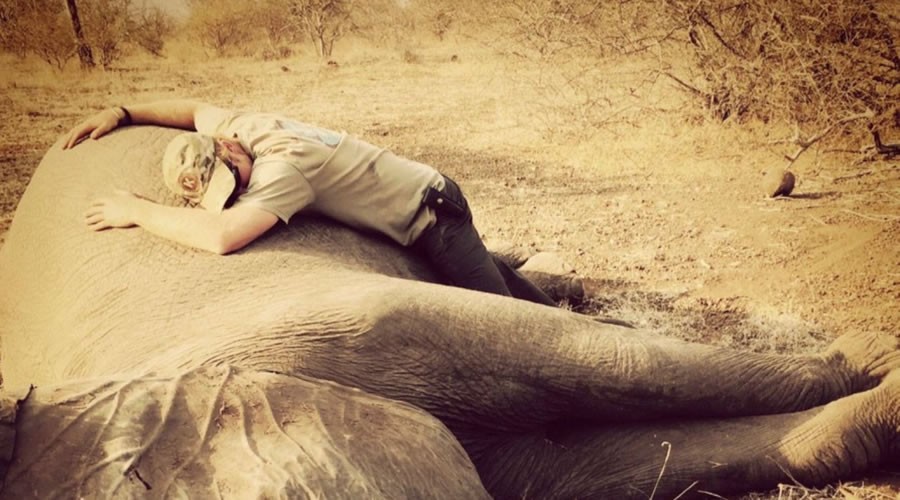
Prince Harry Shares the Stories Behind His Personal Wildlife Photos
Prince Harry posted a collection of his own personal photos today on Instagram to draw attention to the urgent challenges faced by anti-poaching personnel on the ground in southern Africa. The photos (and videos) are from the prince’s last trip to southern Africa, where he worked on front-line conservation projects. He published the photos to coincide with his official trip to […]
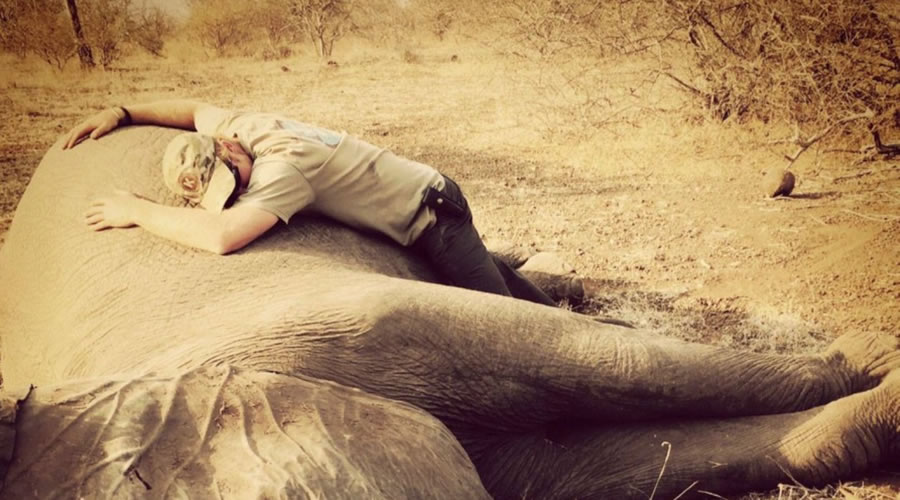
Prince Harry posted a collection of his own personal photos today on Instagram to draw attention to the urgent challenges faced by anti-poaching personnel on the ground in southern Africa.
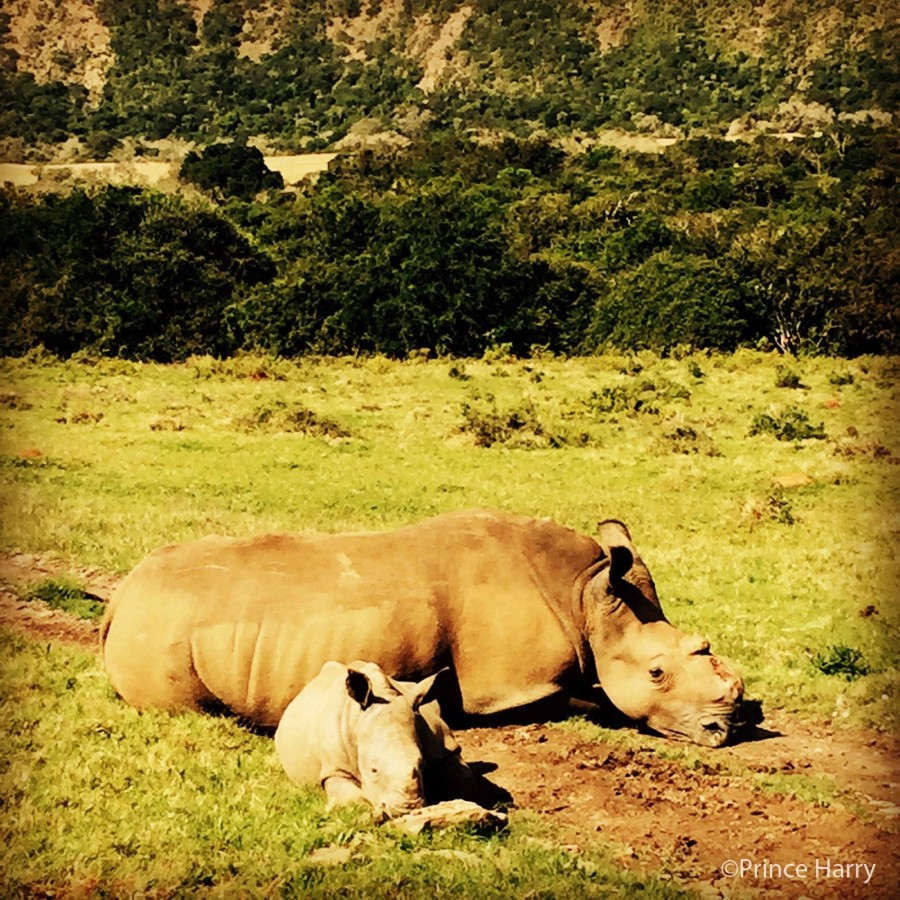
He published the photos to coincide with his official trip to South Africa. After a successful visit to Cape Town and Durban, the Prince travelled to the Kruger National Park yesterday where he was updated on South Africa’s anti-poaching efforts to protect our endangered wildlife.
Today, in a speech to the South African Wildlife College in the Kruger, the prince admitted: “My love of Africa has never been any secret – it’s just been a huge part of my private life. I’ve always wanted to keep it like that until I had the experience of age to give something back to a place that has given me and so many others the freedom and space we all crave.
“This continent has given me thousands of happy memories since 1997 and for that I am indebted to it.”
During the speech he announced that his brother’s United for Wildlife partnership will work with, and fund, the Southern African Wildlife College, adding that: “There is no pretending that any of this will be easy. It won’t be. But when we win this battle and reverse the rise in poaching, the victory will belong first and foremost to those on the frontlines.”
Earlier today the prince had been visibly moved when he was taken to visit the body of a female white rhino and her young calf who were tragically shot dead in a poaching incident a few days ago.
He said in his speech that “we can win this battle. This is a test for all humanity and we cannot afford to fail. Nature needs us to fight her battles and in this case, protect her animals…”
The prince pointed out that the proof that the battle can be won can be seen in stories like that of baby calf Thembi whose mother Thandi became famous around the world after her horn was hacked off by poachers in 2012. (See Prince Harry’s photo above.)
The British Monarchy shared the prince’s photos today (together with messages from the prince) on their Facebook page where many followers expressed their gratitude and pride in the young prince who showed, as one said, that “the life lessons he learned from his mother made a deep and lasting impression. She would have been proud.”
Prince Harry’s Wildlife Photos from Southern Africa…
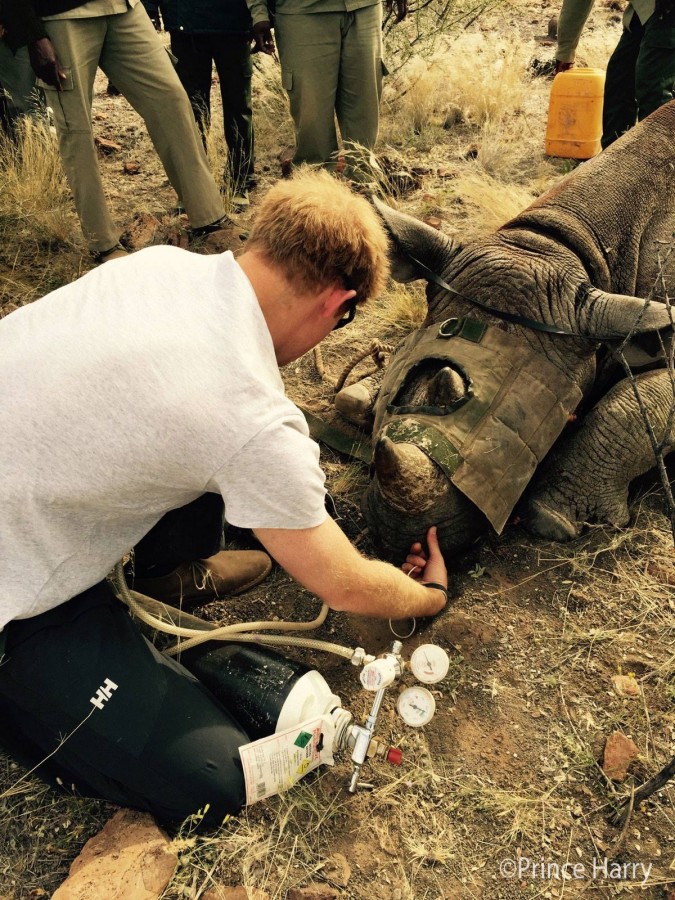
Prince Harry: “I was working with Dr Mark Jago and Dr Pete Morkel in Namibia. Some countries are de-horning small populations of rhino to deter poachers from shooting them. It is a short-term solution and surely no substitute for professional and well-trained rangers protecting these highly sought-after animals. De-horning has to be done every two years for it to be effective and can only realistically be done with small populations in open bush.
“My initial task each time was to monitor the heart rate and oxygen levels and help stabilise them as quickly as possible. My responsibilities then grew to taking blood and tissue samples and the de-horning itself.”
To learn more/help:
https://www.savetherhino.org/africa_programmes/save_the_rhino_trust_namibia
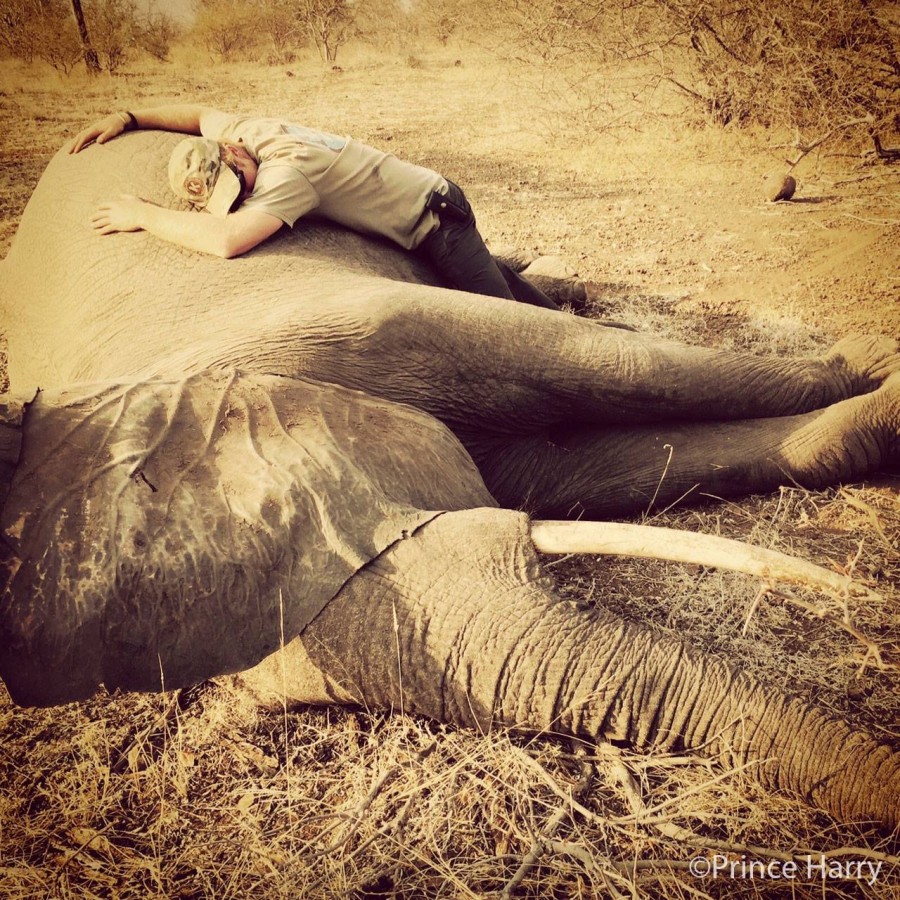
Prince Harry: “After a very long day in Kruger National Park, with five rhinos sent to new homes and three elephants freed from their collars – like this sedated female – I decided to take a moment.
“How can it be that 30,000 elephants were slaughtered last year alone? None of them had names, so do we not care?” – Prince Harry
“I know how lucky I am to have these experiences, but hearing stories from people on the ground about how bad the situation really is, upset and frustrated me.
“How can it be that 30,000 elephants were slaughtered last year alone? None of them had names, so do we not care? And for what? Their tusks?
“Seeing huge carcasses of rhinos and elephants scattered across Africa, with their horns and tusks missing is a pointless waste of beauty.”
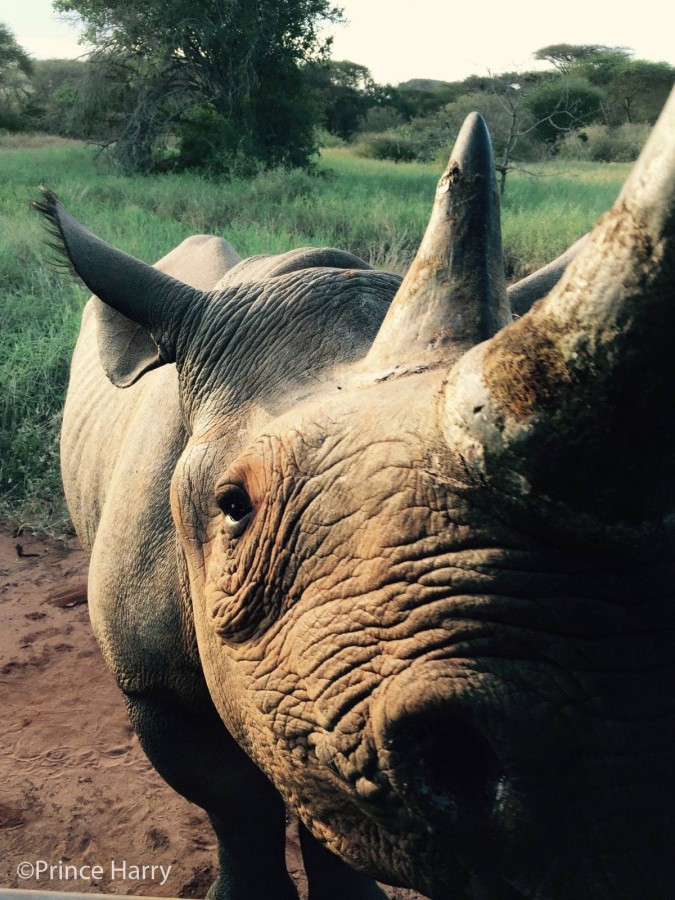
Prince Harry: “This was the second time Zawadi, a female black rhino, met someone from my family. My brother William fed her two years ago in Kent just before she left under a translocation project to Tanzania where she now lives in a sanctuary.
“Thanks to the passion and stubbornness of Tony Fitzjohn OBE and his amazing rangers, she and many others are living it up in the bush and their numbers are growing. She goes nuts for carrots and I loved being able to send William this photo.”
More about Tusk Trust:
http://www.tusk.org/mkomazi-national-park
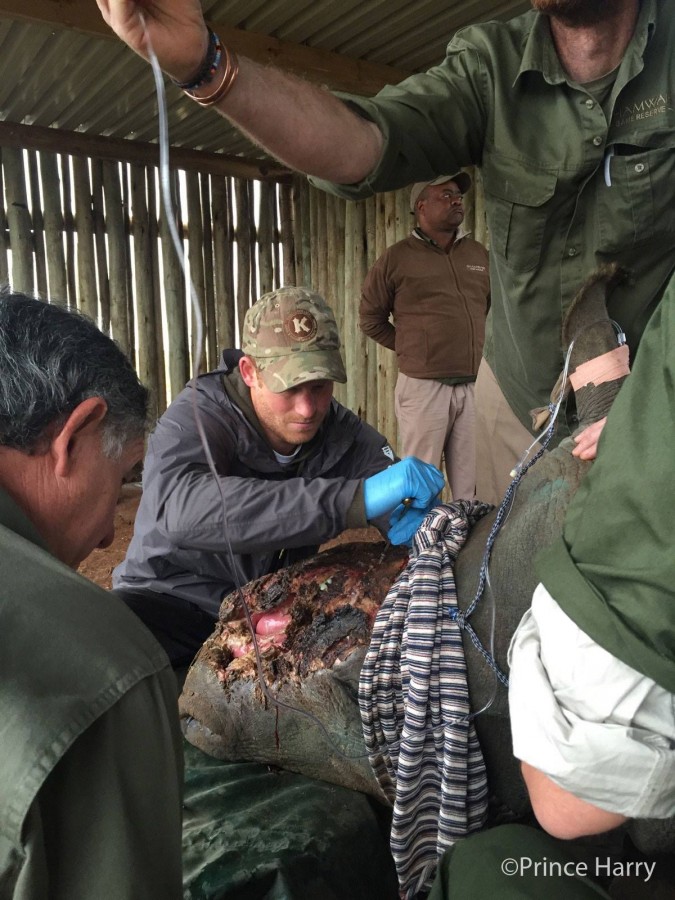
Prince Harry: “By this point many people will have heard of ‘Hope’, a young female black rhino that was brutally wounded by poachers in the Eastern Cape of South Africa. This was the second operation to try to save this animal’s life.
“Some poachers use a dart gun and tranquilize the animal so as to not have to fire a shot that would be heard. They then hack their face off while the animal is paralysed before running off with the horn.
“Local communities saw her stumbling through the bush and then alerted the authorities. Thanks to Dr William Fowlds and his team, Hope survived and is making a speedy recovery. I stared into her eyes while operating on her and thought at first that it would have been better and fairer to put her down rather than put her through the pain.
“Afterwards I was told of another female called Thandi who was in a similar state in 2012. She now has a baby calf called Thembi.
“Every single rhino matters.”
More info/How you can Help:
www.wildernessFoundation.co.za
Full Transcription of Speech by Prince Harry at the South African Wildlife College, Kruger National Park today (2 December 2015):
Thank you everyone for the warm welcome here this morning.
As someone who cares deeply about conservation, Africa and the protection of endangered animals, I look up to rangers with a huge amount of respect, knowing the hardships you face on a daily basis.
This summer I was able to spend several months working with you and your peers here at Kruger and in places across southern Africa. My love of Africa has never been any secret – it’s just been a huge part of my private life. I’ve always wanted to keep it like that until I had the experience of age to give something back to a place that has given me and so many others the freedom and space we all crave. This continent has given me thousands of happy memories since 1997 and for that I am indebted to it.
After a summer working alongside rangers, I now fully understand the skill you bring to your work, the sacrifices you and your families make for you to do it, and the perseverance you demonstrate every day in the face of huge challenge. To those of you graduating today can I say congratulations – you are part of a profession that cannot be appreciated enough and that is dealing with very difficult circumstances. In my view: rangers are heroes. I hope you are incredibly proud of your achievements.
Kruger is one of the most beautiful places on Earth. Its animals are a huge part of South Africa’s economy. Across all of Africa 80% of tourism revenue is dependent on people coming to see iconic wildlife.
But in recent years Kruger has also become a major killing field. The numbers of rhinos poached in South Africa has grown by nearly 500% in just five years, with most of these occurring in Kruger. Already this year 1,500 rhinos have been killed in this country. That is four every day. If current poaching rates continue there will be no wild African elephants or rhinos left by the time children born this year, like my niece, Charlotte, turn 25. If we let this happen, the impact on the long-term prosperity of this country and on the natural heritage of the planet will be enormous and irreversible.
“Bad taste in fashion and decoration, and disproven beliefs in medicine are leading some people to covet animal products with no care for the consequences.” – Prince Harry
Demand for rhino horn and ivory on the other side of the Earth is fuelling this carnage. Bad taste in fashion and decoration, and disproven beliefs in medicine are leading some people to covet animal products with no care for the consequences. People are willing to let a species go extinct so they can have an ivory trinket, Rhino horn doorstop or get a supposed cure for a headache.
The market value for rhino horn has grown significantly and has created a huge incentive for desperate people to risk their lives for a payday from ruthless criminal traffickers.
In the face of this, it would be easy to become despondent – but all of you here today know that we must not. We can win this battle. This is a test for all humanity and we cannot afford to fail. Nature needs us to fight her battles and in this case, protect her animals, some of which have been on this planet for tens of thousands of years.
I have seen for myself that you and your fellow rangers are doing everything in your power to turn this tide, and we must support your efforts in whatever way we can.
My brother, William, is working at a global level to encourage countries like America and China to lead the way in ending demand for ivory and rhino horn and to help African nations with the resources they need to beat the traffickers.
Next week in London, he will host a global taskforce of transportation firms, government agencies, and wildlife experts to agree an ambitious plan to shutdown global trafficking routes. William has put the fate of endangered species back on the agenda of governments, companies, and NGOs around the world. I am incredibly proud of what he is achieving and will do whatever I can to support him.
I know that here in South Africa the Government is committed to do even more to protect its animals and economy. I have heard from many of you how important the legal framework is if you are to effectively stop poachers before they strike. This should be viewed as a time of war and you need laws that are up to the challenge.
South African leadership in this regard has set an example for others to follow, just as the South African Environment Minister Edna Molewa did last week in challenging the recent court ruling that people should be allowed to buy and sell rhino horn. It’s not for me to second guess a court or the legal reasons behind its decision, but what I strongly believe is that the legalisation of rhino horn trading will accelerate the path to extinction.
In addition to stronger laws and global action to stem transport routes and reduce demand, we need to do more to help those of you on the frontline of the conservation battle. I am delighted to announce today that my brother’s United for Wildlife partnership will work with, and fund, the Southern African Wildlife College so that its graduates are equipped with the best techniques and technologies available to protect some of the world’s most endangered species.
There is no pretending that any of this will be easy. It won’t be. But when we win this battle and reverse the rise in poaching, the victory will belong first and foremost to those of you here on the frontlines. So let me thank you for all you have done and all you will do.
Thank you.
MORE
View Prince Harry’s photos and videos on Instagram:
https://www.instagram.com/kensingtonroyal/